Finding balance between work and personal life is a constant challenge in today’s fast-paced world. Many people struggle to juggle the demands of their careers and the desire to nurture their personal relationships and self-care. If you’ve ever found yourself feeling overwhelmed and out of sync, then it may be time to turn to the power of Tarot for guidance. Tarot cards have long been used as a tool for self-reflection and insight, offering a unique perspective on our lives and the choices we make. In this article, we will explore how Tarot can help you identify work-life imbalances, create a Tarot ritual, interpret the cards, and implement practical strategies to find harmony and balance in your life. So, let’s dive in and discover the transformative possibilities that Tarot can offer in our quest for a more fulfilling and balanced existence.
Contents
- Understanding the Tarot
- Identifying Work-Life Imbalances
- Creating a Tarot Ritual
- Work-Life Balance Tarot Spread
- Interpreting the Tarot Cards
- Balance-Enhancing Tarot Practices
- Implementing Work-Life Boundaries
- Embracing Self-Care
- Accepting Imperfections and Adjusting
- Conclusion
-
Frequently Asked Questions
- What is Tarot?
- How does Tarot work?
- Can Tarot predict the future?
- Do I need special abilities to read Tarot?
- How can Tarot help with work-life balance?
- What is a Tarot ritual?
- Which Tarot deck should I use?
- How do I interpret Tarot cards?
- Can I use Tarot for daily guidance?
- Is Tarot a religious practice?
- References
Understanding the Tarot
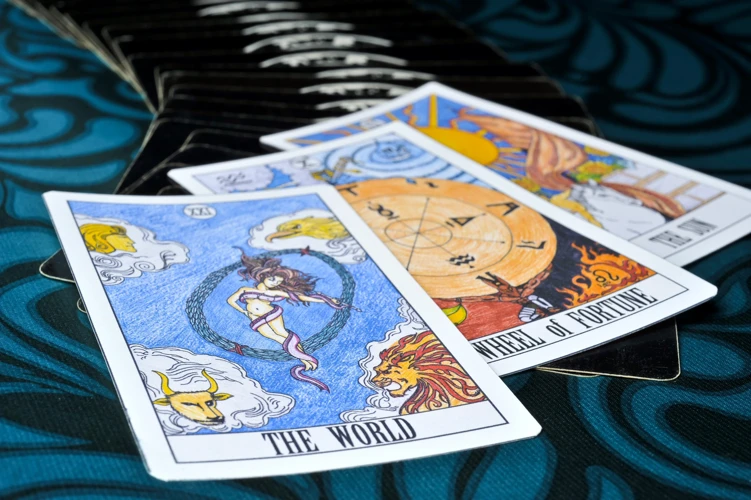
The Tarot is a powerful tool for self-exploration and understanding. Each Tarot card holds a unique symbolic meaning that can provide valuable insights into our lives and the challenges we face. The deck is divided into two main groups: the Major Arcana and the Minor Arcana. The Major Arcana represents significant life events and spiritual lessons, while the Minor Arcana focuses on the day-to-day aspects of our lives. By consulting the Tarot, we can gain a deeper understanding of ourselves and the situations we find ourselves in. In the context of work-life balance, the Tarot can offer guidance and wisdom to help us navigate the complexities of our responsibilities and desires. By exploring the Tarot, we can tap into a wellspring of knowledge and intuition that can guide us towards a more harmonious and balanced existence. So, let’s delve into the rich symbolism and profound insights that the Tarot holds for achieving work-life balance.
The Power of Tarot
The power of Tarot lies in its ability to tap into our intuition and provide us with valuable insights and guidance. Tarot cards are not simply pieces of cardboard with pretty pictures, but rather tools that allow us to connect with our subconscious mind and higher wisdom. When we engage with the Tarot, we are opening ourselves up to a deeper understanding of our thoughts, emotions, and experiences.
Tarot readings can offer clarity and perspective on the challenges we face in achieving work-life balance. It helps us to uncover the root causes of our imbalances and offers solutions to find harmony. The Tarot acts as a mirror, reflecting back to us the patterns, energies, and beliefs that may be impacting our lives.
Through the symbolism and archetypes depicted in the cards, we can gain valuable insights into our work responsibilities, personal obligations, and the dynamics of our relationships. The Tarot provides us with a holistic view of our lives, allowing us to see the interconnectedness between our professional and personal spheres.
By tapping into the power of Tarot, we can access our inner guidance and intuition, gaining a fresh perspective on our work-life dynamics. It can reveal blind spots, illuminate areas of neglect, and offer guidance on setting boundaries, managing priorities, and nurturing relationships.
The transformative power of Tarot in the realm of work-life balance lies in its ability to provide us with a roadmap for finding equilibrium. It offers us the wisdom and guidance we need to make conscious choices, overcome challenges, and align our actions with our true desires and values.
So, embrace the power of Tarot and discover the insights and wisdom it holds for achieving a harmonious and fulfilling work-life balance. Let the Tarot be your guide on this journey of self-discovery and growth.
[To learn more about how Tarot can provide wisdom for work-life balance, check out this informative article on Tarot Wisdom for Work-Life Balance.](/tarot-wisdom-work-life-balance/)
Exploring Work-Life Balance
Exploring work-life balance is an essential step towards finding harmony and fulfillment in both our professional and personal lives. It involves examining the dynamics and interplay between our work responsibilities and our personal desires and commitments. It requires us to assess how much time and energy we are devoting to each aspect of our lives and whether there is a healthy equilibrium. Work-life balance is not about achieving a perfect split between the two realms; rather, it is about finding a sense of harmony that allows us to thrive in both areas.
To explore work-life balance, we need to consider the following aspects:
1. Prioritization: Take a closer look at how you prioritize your time and energy. Assess which areas of your life are receiving the most attention and whether any areas are being neglected. Reflect on whether these priorities align with your values and goals.
2. Boundaries: Setting boundaries is crucial for maintaining work-life balance. Determine clear limits on the amount of time and effort you devote to work and establish designated personal time. This will help prevent work from encroaching on your personal life and vice versa.
3. Reflection: Regularly reflect on how your work-life balance is impacting your overall well-being and satisfaction. Consider whether you feel fulfilled and content in both areas and identify any imbalances that need addressing.
4. Self-Care: Make self-care a priority in your pursuit of work-life balance. Taking care of your physical, mental, and emotional well-being is essential for maintaining resilience and avoiding burnout. Incorporate activities that rejuvenate and nourish you into your daily routine.
Exploring work-life balance is an ongoing process that requires self-awareness, reflection, and conscious decision-making. The insights gained from this exploration can act as a compass to guide us towards a more harmonious existence. By incorporating Tarot insights into this exploration, we can tap into a deeper level of understanding and gain valuable guidance on navigating the complexities of our work and personal responsibilities. For further guidance on finding work-life balance through Tarot, you can refer to /work-life-balance-tarot-guidance/.
Identifying Work-Life Imbalances
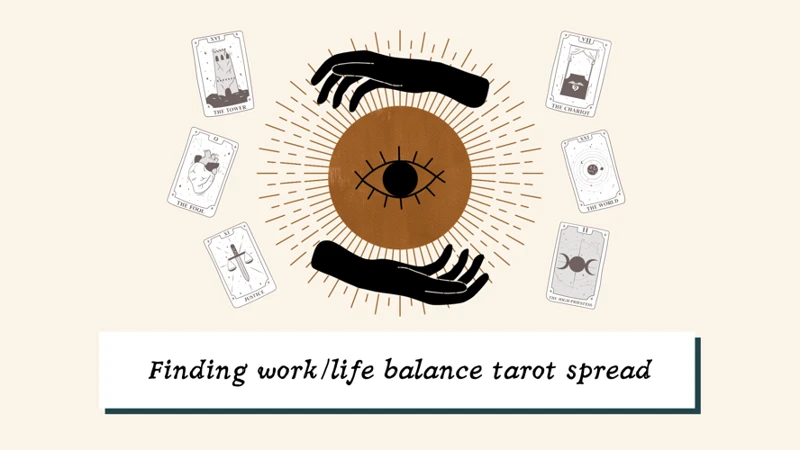
Identifying work-life imbalances is the first step in reclaiming harmony and finding a sense of equilibrium. It’s important to recognize the warning signs that indicate we may be overworking and neglecting our personal lives. One way to do this is by paying attention to our physical and mental well-being. Are we constantly feeling exhausted, experiencing headaches or muscle tension? These can be signs that we’re pushing ourselves too hard. Another aspect to consider is the neglect of personal relationships and activities that bring us joy outside of work. Are we spending quality time with loved ones, pursuing hobbies, or taking time for self-care? If these areas are consistently being overlooked, it may indicate an imbalance that needs to be addressed. By being mindful of these warning signs and taking an honest inventory of our work-life dynamics, we can gain valuable insights into where our imbalances lie and take proactive steps towards bringing our lives back into alignment. For further guidance on navigating the complexities of work and personal responsibilities, you can refer to the Tarot insights on work and personal responsibilities.
Recognizing Overwork Warning Signs
Recognizing Overwork Warning Signs:
It’s crucial to be aware of the warning signs of overwork in order to address imbalances and prevent burnout. The Tarot can serve as a helpful tool in identifying these warning signs and bringing them to our conscious attention. When consulting the Tarot, pay close attention to cards that symbolize stress, exhaustion, or excessive busyness. Cards such as the Ten of Wands or the Nine of Swords may indicate a heavy workload or mental strain. Additionally, pay attention to physical and emotional cues in your own life. Are you constantly fatigued, experiencing frequent headaches, or struggling to sleep? Are you becoming more easily frustrated, irritable, or emotionally drained? These are all signs that you may be overworking yourself. The Tarot can help shed light on these warning signs by encouraging self-reflection and providing guidance for necessary changes. By recognizing and acknowledging these signs, we can take proactive steps to restore balance in our lives and prioritize our well-being.
Assessing Personal Life Neglect
Assessing Personal Life Neglect:
1. Relationships: Take some time to reflect on the state of your personal relationships. Are you neglecting important connections with loved ones such as family, friends, or romantic partners? Are you finding it difficult to make time for meaningful conversations or quality time together? Assessing the health of your relationships is crucial in understanding if personal life neglect is taking place.
2. Hobbies and Interests: Consider whether you have been neglecting your hobbies and interests outside of work. Are there activities that used to bring you joy but have taken a backseat due to work commitments? Assessing if you have been neglecting your personal passions can give insight into whether your work-life balance is off-kilter.
3. Self-Care: Evaluate your self-care routine. Are you neglecting basic self-care practices such as getting enough sleep, eating nutritious meals, or engaging in regular exercise? Assess whether you are prioritizing your physical and mental well-being or if work is overshadowing these important aspects of personal life.
4. Emotional Well-being: Reflect on your emotional state. Are you neglecting your emotional needs, such as processing and expressing emotions or seeking support when needed? Assess whether you are investing time and energy into nurturing your emotional well-being or if work demands have been causing neglect in this area.
Remember, assessing personal life neglect is not about assigning blame but rather gaining awareness of the areas that may need attention. By honestly evaluating where you may be neglecting your personal life, you can take proactive steps to restore balance and cultivate a more fulfilling and harmonious existence.
Creating a Tarot Ritual
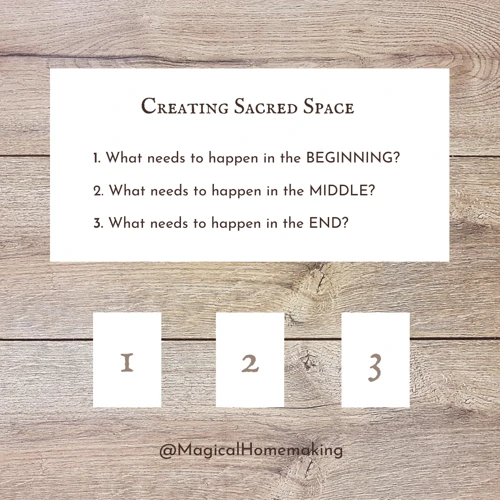
Creating a Tarot ritual can enhance the connection between ourselves and the cards, allowing for a more meaningful and insightful experience. Setting the scene is an important first step in creating a Tarot ritual. Find a quiet and comfortable space where you can focus and relax. Create an atmosphere that promotes a sense of calm and introspection, such as lighting candles, playing soft music, or burning incense. Selecting the right Tarot deck is also crucial, as different decks may resonate with us in unique ways. Choose a deck that speaks to you personally, whether it be through its artwork, symbolism, or overall energy. Finally, tuning into your intuition is key during a Tarot ritual. Take a moment to quiet your mind, breathe deeply, and set your intention for the reading. Trust your instincts and allow your intuition to guide you as you draw and interpret the cards. By creating a sacred space and cultivating a connection with the Tarot, you can enhance the depth and potency of the messages you receive.
Setting the Scene
To set the scene for your Tarot ritual, it’s important to create a sacred and peaceful space where you can fully immerse yourself in the energy of the cards. Begin by finding a quiet and comfortable area in your home where you won’t be disturbed. Clear away any clutter and create a clean and inviting environment. Consider lighting candles or incense to invoke a sense of tranquility and spirituality. You may also choose to play soft instrumental music or nature sounds to enhance the ambiance. It can be helpful to have a designated altar or table where you can display your Tarot deck and any other meaningful objects, such as crystals or personal mementos. Surround yourself with items that hold positive energy and inspire you. Take a few moments to ground yourself and center your energy before you begin your Tarot practice. You can do this by focusing on your breath, meditating, or performing a brief grounding exercise. By setting the scene in this way, you create a sacred space that is conducive to deep introspection and meaningful connection with the Tarot cards.
Selecting the Right Tarot Deck
Selecting the right Tarot deck is an essential aspect of creating a meaningful Tarot ritual for work-life balance. With numerous Tarot decks available, it’s crucial to find one that resonates with you and reflects your personal style and energy. The first consideration when choosing a Tarot deck is the artwork and imagery. Each deck has its unique art style, ranging from traditional to modern and everything in between. Take the time to explore different deck options and find one that visually speaks to you and evokes the emotions and themes you connect with. Additionally, consider the size and tactile feel of the cards. Some people prefer standard-sized decks, while others may find larger or smaller cards more comfortable to handle. The tactile experience of shuffling and holding the cards can enhance the connection and intuition during readings. Another factor to consider is the theme or symbolism of the Tarot deck. Certain decks may focus on specific themes, such as astrology, mythology, or nature. If a particular theme aligns with your interests and resonates with your journey towards work-life balance, it may be worth exploring decks that incorporate those elements. Lastly, look into the reputation and reviews of the deck you are interested in. This can provide insights into others’ experiences and help you gauge its suitability for your needs. Remember, there is no right or wrong choice when it comes to selecting a Tarot deck. Trust your intuition and choose the one that speaks to you on a deep level, as it will become an essential tool in your work-life balance journey.
Tuning into Your Intuition
Tuning into your intuition is a crucial aspect of working with the Tarot. Your intuition is the inner voice that guides you, offering insights and wisdom beyond logical reasoning. When it comes to finding work-life balance, your intuition can play a significant role in guiding you towards what truly nourishes and fulfills you. To tap into your intuition during a Tarot reading, it’s important to create a serene and focused environment. Find a quiet space where you can be alone and free from distractions. Take a few moments to center yourself through deep breathing or meditation. As you shuffle the Tarot cards, focus on your intention of seeking guidance for work-life balance. Trust your instincts as you choose the cards for your reading. Allow your intuition to guide your interpretation of each card’s meaning. Pay attention to any sensations or emotions that arise as you lay out the cards and contemplate their messages. By tuning into your intuition, you can unlock profound insights and guidance that will support you on your journey towards achieving a harmonious work-life balance. Trust yourself, trust the cards, and trust the wisdom that lies within.
Work-Life Balance Tarot Spread
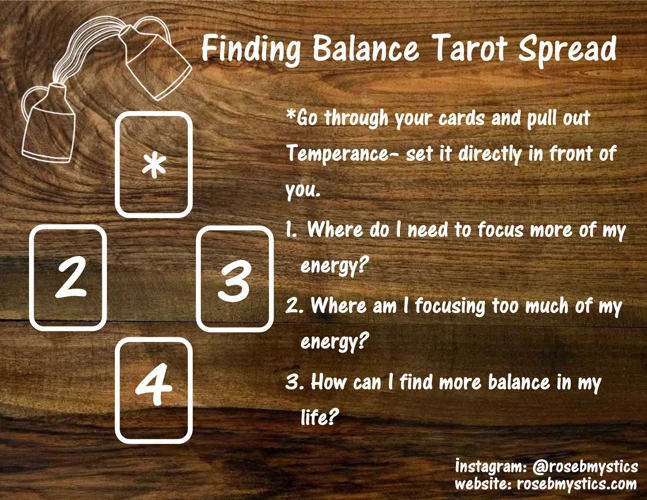
The Work-Life Balance Tarot Spread is a powerful tool for gaining specific insights into the present situation and identifying the root causes of imbalance. This tarot spread consists of five cards, each representing a different aspect of work-life balance. The first card represents the present situation, shedding light on the current state of your work-life harmony. The second card uncovers the root causes of any imbalance, whether it be excessive workload, lack of boundaries, or personal neglect. The third card focuses on managing priorities, helping you identify areas where you can align your actions with your values and goals. The fourth card emphasizes the importance of nurturing relationships, both personal and professional, to foster a sense of connection and support. The final card encourages you to prioritize self-care and recharge, reminding you of the essential role of physical and emotional well-being in achieving balance. By using the Work-Life Balance Tarot Spread, you can gain valuable insights and practical guidance to bring greater harmony and fulfillment into your life.
The Present Situation
In the Tarot spread for work-life balance, “The Present Situation” card reflects the current state of your work-life harmony. This card represents where you are right now in terms of balancing your professional responsibilities and personal needs. When interpreting “The Present Situation” card, consider the following:
1. Card Meaning: Examine the symbolism, imagery, and message conveyed by the card. Each Tarot card carries its own unique energy and significance. For example, if you draw the Two of Cups, it may suggest that you have a good balance between your work and personal life, with strong emotional connections and harmony.
2. Work-Life Integration: Assess how well your work and personal life are integrated. Are you able to seamlessly transition between your professional and personal roles? Or do you find it challenging to separate the two? Pay attention to any areas of overlap or boundaries that may need adjusting.
3. Emotional Well-being: Consider your emotional state in relation to your work-life balance. Are you feeling stressed, overwhelmed, or content? The card you draw may provide insights into how your emotions are affected by the current state of harmony or imbalance.
4. Time and Energy Allocation: Evaluate how much time and energy you are dedicating to work and personal pursuits. Are you neglecting one aspect in favor of the other? The card can offer clues as to whether you are investing an appropriate amount of time and energy into maintaining a healthy balance.
Remember, the interpretation of “The Present Situation” card is subjective and may vary based on the specific Tarot deck and individual intuition. Take your time to reflect on the card’s message and how it aligns with your current work-life dynamics.
Root Causes of Imbalance
When it comes to finding balance in our work and personal lives, it’s crucial to identify the root causes of any imbalances we may be experiencing. The Tarot can provide valuable insights into the underlying factors contributing to this lack of equilibrium. In a Tarot reading focused on the “Root Causes of Imbalance,” specific cards can shed light on the issues and patterns that are disrupting our harmony. For instance, the Four of Cups may indicate a sense of complacency or boredom in our work, leading to a yearning for something more fulfilling. The Eight of Swords could signify feelings of being trapped or restricted by external circumstances, preventing us from prioritizing our personal life. Alternatively, the Ten of Pentacles might suggest an obsessive focus on financial stability, causing neglect in other areas of our lives. By understanding the root causes of our imbalance, we can begin addressing them and seeking the necessary changes to achieve a healthier and more fulfilling work-life dynamic. With the wisdom of the Tarot, we can uncover hidden aspects and gain the clarity needed to bring our lives back into alignment.
Managing Priorities
Managing priorities is a crucial aspect of achieving work-life balance. When we have numerous responsibilities and tasks vying for our attention, it can be overwhelming to determine what truly needs our focus. The Tarot offers valuable insights and guidance in this area. During a Tarot reading, you can specifically ask about managing your priorities and gain clarity on where to direct your energy and efforts. The cards may reveal which areas of your life are in need of attention and which ones can be temporarily put on hold. The Major Arcana cards, such as The Hierophant or The Emperor, can symbolize structure, order, and the establishment of priorities. The Minor Arcana cards, particularly the Suit of Swords, often depict decision-making and prioritizing conflicting aspects of our lives. By interpreting these cards and their messages, you can make informed choices about how to allocate your time and energy. It may be necessary to reassess your current commitments and obligations, and be willing to make adjustments to create a healthier balance. Remember that managing priorities is not about trying to do everything at once, but rather about making conscious choices that align with your values and overall well-being. With Tarot guidance, you can gain clarity and confidence in managing your priorities, allowing you to create a more harmonious and balanced life. (Word count: 221)
Nurturing Relationships
Nurturing relationships is an essential aspect of achieving work-life balance, as our connections with others greatly impact our overall well-being. When it comes to Tarot and the topic of nurturing relationships, the cards can provide insights into the dynamics of our relationships and offer guidance on how to strengthen them. In a Tarot spread focused on nurturing relationships, cards such as the Two of Cups, the Lovers, or the Empress may indicate a need for greater emotional connection and intimacy within partnerships. These cards can serve as a reminder to prioritize quality time, open communication, and acts of kindness to cultivate stronger bonds. The Ace of Cups may suggest the importance of self-love and self-care as a foundation for building healthy relationships. Other cards, such as the Three of Cups or the Ten of Cups, may indicate the significance of celebrating and cherishing the connections we have with friends and loved ones. On the other hand, challenging cards like the Five of Cups or the Tower can signal issues or conflicts that require attention and resolution. These cards can serve as prompts to have honest conversations, address misunderstandings, or seek professional support if needed. Through Tarot, we can gain deep insights into our relationships and use that knowledge to foster nurturing, supportive, and fulfilling connections in both our personal and professional lives. So, take the time to reflect on the Tarot cards that come up, consider their messages, and implement the necessary actions to nurture your relationships and find greater balance in your life.
Recharging and Self-Care
Recharging and self-care are essential components of achieving and maintaining work-life balance. When we neglect our own well-being, we become depleted and less effective in both our professional and personal lives. The Tarot offers valuable insights and guidance on how we can prioritize self-care and recharge our energy.
One card that symbolizes the need for self-care is the Four of Swords. This card often depicts a figure lying down in a peaceful state, indicating the importance of rest and rejuvenation. It serves as a reminder to take time for ourselves, to step away from our responsibilities, and relax. When this card appears in a reading, it’s a sign to prioritize self-care practices such as meditation, deep breathing exercises, or engaging in activities that bring joy and relaxation to your life.
Another card that highlights the significance of self-care is the Nine of Cups. This card represents emotional fulfillment and contentment. It encourages us to focus on our own happiness and well-being. When this card appears, it’s a reminder to indulge in activities that bring us joy, whether it’s spending time with loved ones, pursuing hobbies, or simply taking a break from our busy schedules.
Incorporating self-care into our daily lives can be challenging, but it is crucial for maintaining balance. Creating a self-care routine that includes activities like exercise, journaling, or practicing mindfulness can help us recharge and restore our energy levels. It’s important to remember that self-care is not a luxury or a selfish act, but rather a necessary investment in our overall well-being.
By consulting the Tarot, we can gain valuable insights on what areas of our lives may require more attention and self-care. The cards serve as gentle reminders to nurture ourselves and prioritize activities that help us recharge and restore our energy. Through incorporating self-care practices and listening to the wisdom of the Tarot, we can achieve a true sense of balance and harmony in our work and personal lives.
Interpreting the Tarot Cards
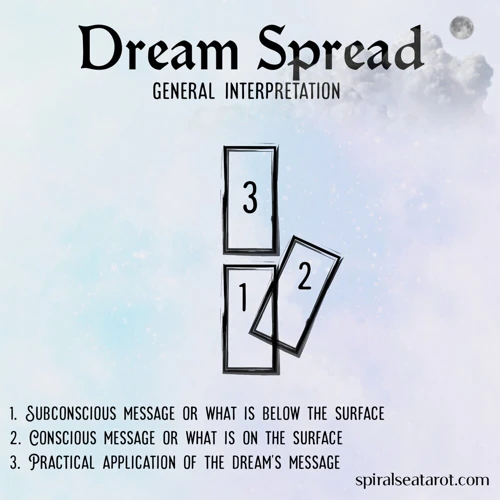
Interpreting the Tarot cards is a fascinating process that requires a combination of intuition, symbolism, and personal reflection. Each card in the Tarot deck holds its own unique meaning and message. The Major Arcana cards, such as The Fool, The Lovers, and The World, represent significant life events and archetypal energies. These cards often reflect deep psychological and spiritual aspects of our journey. On the other hand, the four suits of the Minor Arcana─Cups, Pentacles, Wands, and Swords─represent the various areas of our daily lives and experiences. Each suit is associated with specific elements and themes, offering insights into emotions, material aspects, creativity, and intellectual pursuits. When interpreting the Tarot cards, it is essential to consider the card itself, its position in the spread, and the surrounding cards. By tapping into our own intuition and connecting with the rich symbolism of the cards, we can unlock profound messages and gain clarity on our work-life balance journey. To learn more about interpreting Tarot cards for work-life balance guidance, you can explore this link.
The Major Arcana
The Major Arcana is a significant component of the Tarot deck, consisting of 22 cards that represent major life events and archetypal energies. Each card in the Major Arcana holds its own unique symbolism and meaning, offering profound insights into our personal and spiritual journeys. These cards are often associated with powerful forces and life-altering experiences, making them particularly relevant when it comes to understanding and finding balance between work and personal life.
One of the most well-known cards in the Major Arcana is the Fool, symbolizing new beginnings and taking risks. This card encourages us to embrace a sense of adventure and spontaneity in both our careers and personal lives. The Magician, on the other hand, represents our ability to manifest our desires and harness our skills to create the life we want. It reminds us of the power we hold within ourselves to find a balance between our ambitions and personal fulfillment.
Other cards in the Major Arcana, such as the Hierophant and the Empress, offer guidance on seeking wisdom and nurturing relationships. The Hierophant emphasizes the importance of finding mentors or seeking guidance from experienced individuals who can provide insights and support in our professional and personal lives. The Empress, on the other hand, embodies creativity, abundance, and nurturing energy. It reminds us to prioritize self-care and to create a harmonious environment that encourages both personal and professional growth.
The Major Arcana also includes cards like the Tower and the Death card, which may initially seem daunting or negative. However, these cards symbolize necessary transformations and the release of old patterns that no longer serve us. They remind us that change is an inevitable part of life, and by embracing it, we can find greater balance and alignment with our true selves.
By studying and reflecting on the cards of the Major Arcana, we can gain valuable insights into our work-life balance. The symbolism in these cards can illuminate areas where we may be imbalanced or neglecting certain aspects of our lives. They can also provide guidance on how to make necessary adjustments and find greater harmony between our work responsibilities and personal well-being. So, let’s explore the profound wisdom and transformative power of the Major Arcana as we strive to achieve a more balanced and fulfilling life.
The Suit of Cups
The Suit of Cups is one of the four suits in the Tarot deck, and it represents emotions, relationships, intuition, and creativity. Each card in the Suit of Cups holds a unique meaning and offers insights into the realm of our emotional and spiritual lives. Here is a breakdown of the cards in the Suit of Cups and their interpretations:
1. The Ace of Cups: This card symbolizes new beginnings, love, and emotional fulfillment. It represents the potential for deep emotional connections and the start of a new phase in your relationships.
2. The Two of Cups: This card signifies partnership, harmony, and balance in relationships. It indicates a strong emotional bond and mutual support between two individuals.
3. The Three of Cups: This card represents celebration, friendship, and joyous gatherings. It denotes harmonious relationships, social connections, and a sense of belonging.
4. The Four of Cups: This card suggests introspection, contemplation, and a need for emotional fulfillment. It signals a state of being emotionally withdrawn and encourages you to reflect on your current emotional state.
5. The Five of Cups: This card signifies loss, disappointment, and grief. It represents a period of emotional turbulence and encourages you to find ways to heal and move forward.
6. The Six of Cups: This card symbolizes nostalgia, innocence, and childhood memories. It indicates a reunion or connection with someone from your past and reflects on the importance of innocence and simplicity in relationships.
7. The Seven of Cups: This card represents choices, dreams, and illusions. It indicates a time of decision-making and reminds you to be aware of unrealistic expectations or fantasies that may cloud your judgment.
8. The Eight of Cups: This card suggests letting go, walking away, and seeking emotional fulfillment elsewhere. It signifies a period of introspection and the need to leave behind what no longer serves your emotional well-being.
9. The Nine of Cups: This card often referred to as the “wish card,” symbolizes satisfaction, emotional fulfillment, and contentment. It represents inner joy, abundance, and the realization of your heart’s desires.
10. The Ten of Cups: This card represents harmony, emotional stability, and fulfillment in relationships. It signifies a loving and supportive family dynamic, as well as the achievement of emotional well-being.
The Suit of Cups offers guidance and insights into our emotional well-being and relationships. It encourages us to explore our feelings, nurturing connections, and embrace our intuition in order to find balance and fulfillment in our personal lives. Whether the cards reveal challenges or blessings, the Suit of Cups provides valuable guidance and direction for achieving emotional harmony and deepening our understanding of ourselves and others.
The Suit of Pentacles
The Suit of Pentacles in the Tarot represents the element of Earth and is associated with the physical realm, material possessions, and financial matters. It signifies our connection to the physical world and our ability to manifest abundance and prosperity. Each card within the Suit of Pentacles carries its own unique meaning and offers insights into our relationship with money, career, and the material aspects of our lives.
1. Ace of Pentacles:
The Ace of Pentacles symbolizes new beginnings and opportunities in the material realm. It represents the potential for financial growth, abundance, and the manifestation of our goals and desires. This card signifies a fertile ground for new ventures and the start of a prosperous journey.
2. Two of Pentacles:
The Two of Pentacles signifies balance and juggling competing priorities. It represents the need for careful management of resources and finding harmony between work and personal life. This card reminds us to stay grounded and adaptable as we navigate the ups and downs of our financial responsibilities.
3. Three of Pentacles:
The Three of Pentacles signifies collaboration, teamwork, and the mastery of skills. It represents the rewards that come from hard work, dedication, and craftsmanship. This card encourages us to seek guidance and support from others to achieve success in our endeavors.
4. Four of Pentacles:
The Four of Pentacles symbolizes stability and security. It represents the need to hold onto our resources and establish firm foundations. This card reminds us to find a balance between financial responsibility and generosity, as clinging too tightly to material possessions can hinder personal growth.
5. Five of Pentacles:
The Five of Pentacles signifies financial hardship and a feeling of lack. It represents a challenging period where we may be facing financial setbacks or experiencing a loss of material stability. This card reminds us to seek support from others and have faith in our ability to overcome adversity.
6. Six of Pentacles:
The Six of Pentacles symbolizes generosity, charity, and the balance of giving and receiving. It represents the rewards that come from sharing our resources with others. This card encourages us to find fulfillment in helping those in need and to ensure a fair and equitable distribution of wealth.
7. Seven of Pentacles:
The Seven of Pentacles signifies patience and perseverance. It represents the need to cultivate long-term financial growth and invest in sustainable endeavors. This card reminds us to trust the process and have confidence in our ability to reap the rewards of our efforts over time.
8. Eight of Pentacles:
The Eight of Pentacles symbolizes hard work, skill development, and craftsmanship. It represents a period of focused dedication and a commitment to honing our talents. This card encourages us to invest our time and energy in our chosen profession or creative pursuits to achieve mastery and financial stability.
9. Nine of Pentacles:
The Nine of Pentacles signifies wealth, abundance, and enjoying the fruits of our labor. It represents financial independence and the freedom to live a life of luxury and comfort. This card reminds us to savor our achievements and appreciate the abundance that surrounds us.
10. Ten of Pentacles:
The Ten of Pentacles symbolizes prosperity, legacy, and generational wealth. It represents the culmination of success in both material and familial matters. This card signifies the importance of building a strong foundation for future generations and finding fulfillment in the lasting impact of our work.
The Suit of Pentacles offers us insights and guidance on how to navigate the material aspects of our lives. By understanding the meanings and messages of each card within this suit, we can gain clarity and make informed decisions when it comes to our finances, career, and overall abundance.
The Suit of Wands
The Suit of Wands in the Tarot represents the element of fire, symbolizing passion, energy, inspiration, and ambition. This suit is associated with the realm of work and creativity, making it particularly pertinent to the topic of work-life balance. The Wands cards often depict images of growth, movement, and action, reflecting the need for action and drive in our careers and personal projects. When the Suit of Wands appears in a reading, it can signify a call to pursue our passions and take bold steps towards our goals. It encourages us to ignite our inner fire and channel our energy into productive and fulfilling endeavors. However, the Suit of Wands also carries a warning about burnout and overextending ourselves. It reminds us to find a balance between our ambitions and our well-being, reminding us to listen to our bodies and take breaks when needed. The Wands cards urge us to align our work with our authentic selves, seeking opportunities for growth and self-expression. They serve as a reminder that work should be a source of inspiration and purpose, rather than a drain on our energy. So, when exploring the Suit of Wands in relation to work-life balance, it is essential to consider how our passion and ambition can be harnessed and directed in a way that supports our overall well-being and harmony in all areas of our lives.
In the context of work-life balance, the Suit of Wands offers valuable insights and guidance on how to infuse our work with passion, creativity, and purpose while maintaining a healthy equilibrium. Whether it’s finding ways to incorporate hobbies or side projects into our work, setting boundaries to prevent work from overtaking our personal lives, or tapping into our inner drive to fuel our pursuits, the Suit of Wands can provide powerful and relevant wisdom.
The Suit of Wands speaks to the importance of finding a harmonious blend of ambition, creativity, and self-care in our work and personal lives. It reminds us that our work should be a reflection of our passions and values, and that finding balance requires us to honor both our professional aspirations and our overall well-being. By embodying the qualities of the Suit of Wands – passion, inspiration, and ambition – we can navigate the realm of work-life balance with intention, purpose, and a burning desire for fulfillment.
The Suit of Swords
The Suit of Swords is one of the four suits in the Tarot deck and represents the element of air. It is associated with the intellect, communication, and the power of the mind. The cards in this suit often depict scenes of conflict, struggle, and mental challenges. Each card in the Suit of Swords carries its own unique meaning and symbolism that can offer valuable insights into our work and personal lives.
1. Ace of Swords: The Ace of Swords represents new ideas, clarity, and mental breakthroughs. It signifies a fresh start and the opportunity to cut through confusion or obstacles that may be hindering progress. This card encourages us to embrace clear communication and logical thinking when it comes to finding a balance between our work and personal lives.
2. Two of Swords: The Two of Swords suggests a need for decision-making and finding balance between conflicting aspects of our lives. It reflects a state of weighing options and finding a middle ground. This card reminds us that sometimes compromise and finding a harmonious solution is necessary to maintain work-life balance.
3. Three of Swords: The Three of Swords symbolizes heartbreak, disappointment, and emotional turmoil. It indicates a need to confront and heal emotional pain and challenges that may be affecting our ability to find harmony in our work and personal lives. This card reminds us to prioritize self-care and address emotional well-being.
4. Four of Swords: The Four of Swords signifies a period of rest, recovery, and introspection. It suggests taking a break and finding solace in solitude to recharge and gain clarity. This card emphasizes the importance of self-care and creating boundaries to maintain work-life balance.
5. Five of Swords: The Five of Swords represents conflict, competition, and power struggles. It reminds us to be mindful of how we approach challenges and conflicts in our lives, both in the workplace and in our personal relationships. This card encourages us to seek win-win situations and foster cooperation instead of engaging in destructive battles.
6. Six of Swords: The Six of Swords denotes a transition and a journey towards calmer waters. It symbolizes moving away from chaos and finding a sense of peace and stability in our work and personal lives. This card signals that we are on the right path towards finding balance and navigating through challenges.
7. Seven of Swords: The Seven of Swords suggests the need for caution and strategic thinking. It warns against dishonesty, deception, or taking shortcuts to achieve work-life balance. This card reminds us to be authentic and align our actions with our true values and desires.
8. Eight of Swords: The Eight of Swords represents feelings of restriction, self-imposed limitations, and being trapped in negative thought patterns. It signifies the need to break free from limiting beliefs and perceptions that may hinder our ability to find harmony. This card prompts us to challenge our own mental barriers and seek alternatives that can lead to balance.
9. Nine of Swords: The Nine of Swords signifies worry, anxiety, and sleepless nights. It reflects the mental toll that excessive work or personal stress can have on our well-being. This card serves as a reminder to prioritize self-care, seek support, and address the root causes of stress to restore balance.
10. Ten of Swords: The Ten of Swords symbolizes endings, loss, and surrender. It represents letting go of old ways and embracing new beginnings. This card encourages us to release any negative patterns or situations that are hindering our work-life balance and to be open to new possibilities.
The Suit of Swords offers profound insights into the challenges and opportunities we encounter in our pursuit of work-life balance. By delving into the meanings of each card, we can gain a better understanding of our own mental processes, conflicts, and the actions we can take to harmonize our work and personal lives.
Balance-Enhancing Tarot Practices
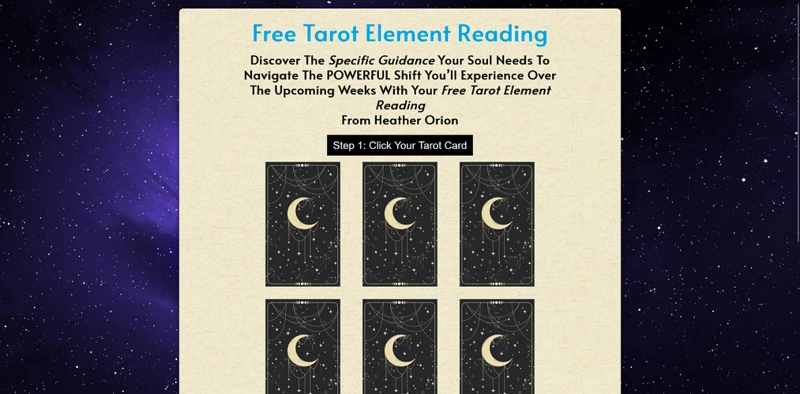
Balance-enhancing Tarot practices can provide a structure and routine to support your journey towards work-life balance. Consider incorporating morning reflections as part of your daily routine, drawing a card to set an intention for the day ahead and gain insight into the energies at play. Mid-day guidance can involve a quick Tarot reading to check in with yourself and make any necessary adjustments to your priorities. Evening contemplation can be a time to reflect on the events of the day and draw a card for guidance on how to find peace and relaxation in the evening hours. These practices can help you stay connected to your intuition and create a sense of rhythm and flow in your daily life, guiding you towards a more harmonious and balanced existence.
Morning Reflections
Morning reflections are an essential practice for setting the tone of your day and promoting work-life balance. Start by finding a quiet and comfortable space where you can be alone with your thoughts. Take a few deep breaths to center yourself and clear your mind. Next, draw a Tarot card or cards to gain insights specifically related to your work and personal life. Reflect on the imagery, symbolism, and messages conveyed by the cards. Consider how they relate to your current situation and any imbalances you may be experiencing. Write down your thoughts and observations in a journal to further deepen your understanding. This process not only allows you to gain clarity and perspective, but it also serves as a reminder to prioritize your well-being and make conscious choices throughout the day. By engaging in morning reflections with Tarot, you can set intentions, align your priorities, and approach your work and personal life with a sense of purpose and balance.
Mid-Day Guidance
Mid-day is a vital moment to check in with ourselves and ensure that we are on track for a balanced day. During this time, we can draw inspiration and guidance from the Tarot to realign and refocus our energy. Here are some tarot practices for mid-day guidance:
1. Daily Card Reflection: Draw a single card and reflect on its meaning. This card can serve as a reminder or a message for the rest of the day. Pay attention to the symbolism and messages conveyed by the card, and consider how it may relate to your current challenges or areas of focus.
2. Intention Setting: Take a few moments to set a specific intention for the rest of the day. This can be done by selecting a card that represents your desired energy or outcome. Write down your intention and keep it somewhere visible as a reminder throughout the day.
3. Mini Tarot Spread: If you have a few extra minutes, you can conduct a mini tarot spread for mid-day guidance. Use a simple three-card spread to gain insight into the current situation, the potential challenges or opportunities, and the recommended course of action for the remainder of the day.
4. Meditation with Tarot Imagery: Close your eyes and visualize the imagery of a meaningful tarot card. Immerse yourself in the symbolism and embrace the feelings and insights that arise. Allow this meditation to bring clarity and inspiration to your mid-day.
Remember, mid-day guidance doesn’t have to be time-consuming. Even a few minutes spent with the Tarot can bring focus and perspective to your day, helping you stay aligned with your goals and maintain a sense of balance.
Evening Contemplation
Evening contemplation is a key practice in enhancing work-life balance through the use of Tarot. As the day winds down and we prepare for rest, setting aside time for reflective contemplation can help us gain clarity and insights. Find a quiet and comfortable space where you can be alone with your thoughts. Take out your Tarot deck and shuffle it, allowing your energy to flow into the cards. As you draw a card or multiple cards to contemplate, focus your attention on any feelings or thoughts that arise. The evening contemplation practice with Tarot allows you to review your day and evaluate the balance between your work and personal life. Pay attention to any patterns or recurring themes that you notice in the cards. Are there any cards that represent stress, overwhelm, or neglect? Are there any cards that symbolize relaxation, joy, or connection? Reflect on these messages and consider how they align with your current work-life situation. Use this time to set intentions for the next day, visualizing how you want to incorporate more balance and harmony into your life. Whether it’s carving out more personal time, establishing boundaries in your work, or nurturing your relationships, the insights gained through evening contemplation with Tarot can guide you toward a more balanced existence. So, embrace this practice and let it be a gentle reminder to prioritize your well-being and create a harmonious equilibrium in all aspects of your life.
Implementing Work-Life Boundaries

Implementing work-life boundaries is crucial for maintaining a healthy equilibrium between our professional and personal lives. One effective strategy is to set clear work hours and communicate them to colleagues and clients. By establishing specific start and end times, we can create structure and predictability in our work schedule. Additionally, creating personal time blocks throughout the day can help us focus on self-care, leisure activities, or spending quality time with loved ones. Delegating tasks and learning to ask for help when needed is another valuable way to prevent work from encroaching on personal time. This can involve redistributing responsibilities among team members or seeking support from family and friends. By implementing these boundaries, we can reclaim our personal time and channel our energy into activities that bring us joy and fulfillment.
Setting Clear Work Hours
Setting clear work hours is essential for creating boundaries between your professional and personal life. Without defined work hours, it can be easy to let work spill over into your personal time, causing imbalance and stress. Here are some tips to help you establish and maintain clear work hours:
1. Determine your ideal work schedule: Reflect on your personal preferences and obligations to determine the best work schedule for you. Consider factors such as your most productive hours, family commitments, and any other commitments outside of work.
2. Communicate your work hours: Make sure your colleagues, clients, and managers are aware of your established work hours. Use email signatures, status updates, or direct communication to inform them about your availability during specific times of the day.
3. Create a work schedule: Use a planner, calendar, or scheduling tool to map out your work hours for each day or week. This visual representation will help you stay organized and committed to your defined work hours.
4. Set boundaries: Clearly communicate your boundaries to others and enforce them. Let coworkers and clients know that you will not be available outside of your defined work hours unless it’s an emergency.
5. Minimize distractions: Eliminate distractions during your work hours that may pull you away from your tasks. This could include turning off social media notifications, closing unnecessary tabs on your computer, or finding a quiet workspace.
6. Practice self-discipline: Stick to your defined work hours as much as possible. Avoid the temptation to answer work-related calls or emails outside of those hours, unless it’s absolutely necessary.
Remember, setting clear work hours is not about being inflexible, but rather about creating a structure that allows you to focus on both work and personal commitments without feeling overwhelmed. By implementing these strategies, you can establish a healthier work-life balance and protect your personal time from the encroachment of work-related tasks.
Creating Personal Time Blocks
Creating personal time blocks is a crucial step in achieving work-life balance. It involves setting aside specific periods of time dedicated solely to personal activities and self-care. Here are some practical tips to help you create effective personal time blocks:
- Plan ahead: Take a few minutes at the start of each week to plan your personal time blocks. Consider what activities you want to engage in, such as hobbies, exercise, spending time with loved ones, or simply relaxing.
- Set boundaries: Clearly define the specific time blocks reserved for personal activities and ensure that others understand and respect these boundaries. Communicate your availability and non-negotiable personal time slots to colleagues, family, and friends.
- Be realistic: Allocate sufficient time for each personal activity, taking into account their respective durations and your energy levels. Avoid overloading your schedule, as this can lead to stress and feelings of being overwhelmed.
- Prioritize self-care: Use personal time blocks to prioritize self-care activities that promote physical, mental, and emotional well-being. This could include meditation, taking a walk in nature, journaling, practicing mindfulness, or engaging in a hobby.
- Stick to the schedule: Treat personal time blocks with the same level of importance as work-related commitments. Avoid the temptation to constantly check work emails or engage in work-related tasks during these designated periods. Stay committed to your personal time and reap the benefits of relaxation and rejuvenation.
By creating personal time blocks and honoring them, you create a structure that allows for a healthy work-life balance. It ensures that you prioritize personal well-being, recharge your energy, and engage in activities that bring you joy and fulfillment. Remember, work will always be there, but taking care of yourself is essential for long-term success and overall happiness.
Delegating and Asking for Help
Delegating and asking for help are essential strategies when it comes to achieving work-life balance. Many individuals believe that they can handle everything on their own, leading to overwhelming workloads and neglecting their personal lives. Delegating tasks allows you to distribute the workload among colleagues or outsourcing certain responsibilities, freeing up time and energy for other aspects of your life. It is important to assess your strengths and weaknesses to determine which tasks can be delegated effectively. Remember, asking for help is not a sign of weakness, but rather a recognition of your limitations and a willingness to create a support system. Identify trusted individuals who can assist you professionally or personally, such as colleagues, family members, or friends. Whether it’s assigning tasks at work or seeking assistance with household chores or childcare, delegating and asking for help can alleviate stress and create more space for activities that bring you joy and fulfillment. Taking the initiative to delegate and ask for help is a proactive approach to achieving a healthier work-life balance.
Embracing Self-Care
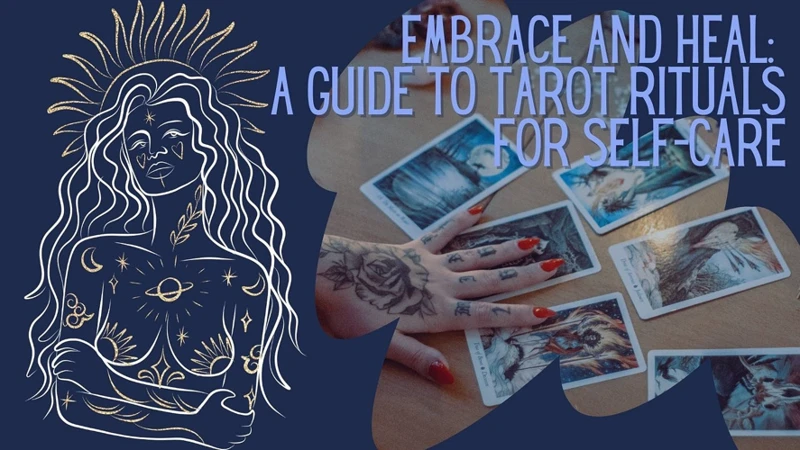
In the pursuit of work-life balance, self-care plays a crucial role in nurturing our overall well-being. Self-care involves prioritizing our physical, emotional, and mental needs to ensure that we are replenished and able to give our best in all areas of our lives. Making self-care a priority can sometimes feel like a challenge, but it is essential for maintaining balance. One way to embrace self-care is by prioritizing activities that bring us joy and rejuvenation. This can include activities such as practicing yoga, going for a walk in nature, journaling, or indulging in a favorite hobby. It’s also important to focus on maintaining our emotional well-being by setting boundaries, practicing self-compassion, and seeking support when needed. Additionally, taking care of our physical health through regular exercise, nourishing food, and sufficient rest is vital for maintaining balance. By embracing self-care, we not only recharge ourselves but also foster a positive and fulfilling work-life balance. So, let’s explore the various self-care strategies and techniques we can incorporate into our daily lives to promote overall well-being and create a stable foundation for harmony and balance.
Prioritizing Self-Care Activities
When it comes to achieving work-life balance, prioritizing self-care activities is crucial. Taking care of yourself is not selfish; it is a necessary step towards maintaining your overall well-being. Here are some key steps to prioritize self-care activities:
1. Identify your self-care needs: Take some time to reflect on the activities that bring you joy, relaxation, and rejuvenation. It could be anything from practicing yoga or meditation, going for a walk in nature, reading a book, or indulging in a hobby. Make a list of these activities and keep it handy as a reminder.
2. Block dedicated self-care time: Treat your self-care activities as important appointments and block out specific time slots for them in your schedule. Whether it’s a daily 30-minute self-care routine or a weekly dedicated self-care day, create a consistent routine that allows you to prioritize and commit to these activities.
3. Set boundaries: Communicate your self-care needs to others and set boundaries to protect that time. Let your colleagues, friends, and family know about your self-care commitments and ask for their support in respecting your designated self-care time.
4. Practice self-compassion: Be kind to yourself and let go of any guilt or feelings of selfishness when prioritizing self-care. Remember that by taking care of yourself, you are better equipped to take care of others and fulfill your responsibilities in a balanced way.
5. Explore new self-care activities: Be open to trying new self-care activities that resonate with you. It could be exploring a new hobby, taking up a creative project, or attending a wellness workshop. Allow yourself to step out of your comfort zone and discover new ways to nurture and care for yourself.
Remember, self-care is not a one-size-fits-all concept. It is unique to each individual, so it’s essential to listen to your own needs and preferences. Prioritizing self-care activities is an investment in your own well-being, enabling you to show up fully in both your work and personal life.
Maintaining Emotional Well-being
Maintaining emotional well-being is crucial for achieving a healthy work-life balance. Here are some strategies and practices that can help nurture your emotional well-being:
1. Practice Self-Compassion: Be kind to yourself and acknowledge your emotions without judgment. Allow yourself to feel and process your emotions, both positive and negative, without suppressing or ignoring them.
2. Seek Support: Surround yourself with a supportive network of friends, family, or a therapist who can offer empathy, understanding, and guidance. Sharing your thoughts and feelings with others can provide a sense of validation and relief.
3. Engage in Mindfulness: Practice mindfulness techniques such as deep breathing, meditation, or yoga to cultivate self-awareness, reduce stress, and enhance emotional well-being. These practices can help you stay present and connected to your emotions.
4. Set Boundaries: Establish clear boundaries in both your personal and professional life to protect your emotional well-being. Communicate your needs and limits to others and prioritize self-care activities that bring you joy and relaxation.
5. Practice Gratitude: Cultivate a mindset of gratitude by regularly acknowledging and appreciating the positive aspects of your life. This can help shift your focus from stress and negativity to a more positive and resilient outlook.
6. Engage in Creative Outlets: Find creative activities that allow you to express and process your emotions, such as painting, writing, or playing a musical instrument. Engaging in these activities can be therapeutic and provide a much-needed emotional outlet.
Remember, maintaining emotional well-being is an ongoing process. It requires self-awareness, self-care, and a commitment to prioritizing your emotional needs. By incorporating these practices into your daily routine, you can nurture your emotional well-being and achieve a more balanced and fulfilling life.
Physical Restoration Strategies
When it comes to maintaining work-life balance, taking care of your physical well-being is essential. Neglecting your physical health can lead to burnout and hinder your ability to find harmony in your life. Here are some physical restoration strategies that you can incorporate into your routine:
1. Regular Exercise: Engaging in regular physical activity not only helps improve your physical fitness but also releases endorphins that boost your mood and reduce stress. Whether it’s going for a run, practicing yoga, or taking a dance class, find an activity that you enjoy and make it a priority in your schedule.
2. Prioritize Sleep: Getting enough quality sleep is crucial for your overall well-being. Establish a consistent sleep schedule and create a relaxing bedtime routine to ensure you get the rest your body needs to function at its best.
3. Healthy Eating Habits: Nourishing your body with a well-balanced diet can greatly impact your energy levels and overall health. Aim to incorporate whole foods, fruits, vegetables, and lean proteins into your meals. Avoid excessive caffeine and sugary snacks, as they can lead to energy crashes and mood swings.
4. Self-Care Activities: Treat yourself to regular self-care activities that promote physical restoration. This could include taking relaxing baths, getting massages, practicing mindfulness or meditation, or engaging in hobbies that bring you joy and relaxation.
5. Take Breaks: Incorporate regular breaks into your workday to stretch, move around, and give your mind and body a chance to recharge. Even short breaks can significantly improve your focus and productivity.
Remember, taking care of your physical well-being is not selfish but rather a necessary step towards finding work-life balance. By prioritizing these physical restoration strategies, you can improve your overall health and well-being, which will positively impact every aspect of your life.
Accepting Imperfections and Adjusting
Finding work-life balance can sometimes feel like an elusive goal, and it’s important to remember that it’s not about achieving perfection. Accepting imperfections and making adjustments along the way is key to maintaining a healthy equilibrium. Tarot can serve as a gentle reminder to embrace our flaws and limitations, and to be compassionate with ourselves. The cards can offer valuable insights into areas where we may be putting too much pressure on ourselves or struggling to let go of unrealistic expectations. By learning from the wisdom of the Tarot, we can acknowledge that balance is a continuous process of learning, adapting, and making conscious choices. It’s about finding harmony in the ebb and flow of life, rather than striving for an unattainable ideal. So, let go of the need for perfection, and allow the Tarot to guide you on a path of self-discovery and growth as you navigate the journey towards work-life balance.
Finding Balance in Small Steps
Finding balance in our lives doesn’t always require monumental changes or drastic actions. Sometimes, it’s the small steps we take that can make the biggest difference. When it comes to achieving work-life balance, it’s essential to approach it with a mindset of gradual progress and incremental improvements. Start by identifying one area of your life that feels out of balance, whether it’s spending too much time at work, neglecting personal relationships, or ignoring self-care. Break down that area into smaller, more manageable tasks or goals. For example, if you’re spending excessive hours at work, commit to leaving the office on time at least two days a week. If you’re neglecting personal relationships, schedule regular date nights or quality time with loved ones. Additionally, prioritize self-care activities by carving out time each day for activities that nourish your mind, body, and spirit. It could be as simple as taking a walk in nature, meditating for a few minutes, or indulging in a favorite hobby. Remember, finding balance is not a one-time achievement but an ongoing process of making conscious choices and adjustments. Celebrate every small step you take towards regaining equilibrium in your life, and remain open to the journey of growth and self-discovery that comes with it.
Learning from Tarot Insights
Learning from Tarot insights is a transformative process that requires an open mind and a willingness to reflect on the messages the cards convey. When interpreting Tarot cards, it’s important to go beyond surface-level meanings and tap into your intuition. Each card contains layers of symbolism and archetypal imagery that can spark a deep sense of knowing within you. Pay attention to the emotions, sensations, and thoughts that arise as you study the cards. These sensations are the keys to unlocking the wisdom they hold.
One of the most valuable aspects of learning from Tarot insights is gaining clarity and perspective on your work-life balance journey. The cards can reveal patterns, hidden motivations, and potential obstacles that may be affecting your ability to find equilibrium. For example, the cards may indicate a need to prioritize self-care or delegate tasks in order to create more space for personal fulfillment. They may also highlight areas where you need to set better boundaries or navigate challenging work relationships. Tarot insights are not meant to provide definitive answers, but rather to offer guidance and provoke thought.
To truly benefit from Tarot insights, it’s important to approach them with curiosity and an open mind. Taking the time to reflect on the messages of the cards can help you gain deeper self-awareness and a better understanding of the choices you make in your work and personal life. Consider keeping a Tarot journal where you can record your interpretations, thoughts, and reflections. This will allow you to track your progress and revisit your insights over time, identifying patterns and areas for growth.
Remember, Tarot is not a magic solution, but rather a tool for self-discovery and personal growth. As you learn from Tarot insights, be gentle with yourself and embrace the process of learning and growing. Embrace the imperfect nature of the journey and be open to adjusting your approach as needed. Tarot can be a profound source of guidance and wisdom, but ultimately, it’s up to you to take the insights and apply them to create the harmonious work-life balance you desire.
By integrating the lessons learned from Tarot into your daily life, you can make empowered choices, set healthy boundaries, prioritize self-care, and cultivate a sense of balance that supports your overall well-being. So, embrace the wisdom that Tarot can offer and let it be your companion on your journey towards finding harmony in work and personal life.
Conclusion
The journey towards finding harmony and balance between work and personal life can be challenging, but with the guidance of Tarot, it becomes a rewarding and transformative experience. Throughout this article, we have explored the power of Tarot in understanding our work-life imbalances and implementing practical strategies for improvement. By creating a Tarot ritual, selecting the right deck, and tuning into our intuition, we can tap into the wisdom of the cards to gain clarity on our present situation, identify root causes of imbalance, manage priorities, nurture relationships, and prioritize self-care. Tarot cards offer a unique lens through which we can interpret our experiences and make meaningful changes in our lives. By establishing work-life boundaries, embracing self-care, accepting imperfections, and adjusting as needed, we can gradually create a more harmonious existence. Remember that finding balance is an ongoing process, and it is important to celebrate the small steps towards equilibrium. Trust in the insights that Tarot provides, and embrace the transformative journey towards a more fulfilling and balanced life. With the guidance of Tarot, you have the power to create the harmony you seek.
Frequently Asked Questions
What is Tarot?
Tarot is a deck of 78 cards, each with its own unique symbolism and meaning. It is often used as a tool for spiritual guidance, self-reflection, and divination.
How does Tarot work?
Tarot works by tapping into our intuition and subconscious mind. When we draw cards and interpret their meanings, we gain insights and perspectives that can help us navigate our lives.
Can Tarot predict the future?
Tarot does not predict the future with certainty. Instead, it offers guidance and possibilities based on our current circumstances and choices. The future is ultimately shaped by our actions.
Do I need special abilities to read Tarot?
No, anyone can learn to read Tarot. It is more about developing our intuition, understanding the symbolism, and connecting with the cards on a personal level.
How can Tarot help with work-life balance?
Tarot can provide insights into the areas of our lives that may be out of balance, helping us identify imbalances and prioritize our time and energy. It can also offer guidance on setting boundaries and creating harmony.
What is a Tarot ritual?
A Tarot ritual is a structured practice that prepares us for a Tarot reading. It involves setting intentions, creating a sacred space, and connecting with the cards and our intuition.
Which Tarot deck should I use?
There are many Tarot decks available, and it’s important to choose one that resonates with you personally. Look for a deck that captures your attention and speaks to your intuition.
How do I interpret Tarot cards?
Interpreting Tarot cards involves understanding their individual meanings, as well as how they relate to each other in a spread. It also requires tapping into your own intuition and personal associations.
Can I use Tarot for daily guidance?
Absolutely! Tarot can be used as a daily tool for reflection and guidance. Pulling a card each day and reflecting on its message can provide insights and inspiration for navigating your day.
Is Tarot a religious practice?
Tarot is not tied to any specific religion. It is a tool that can be used by those of any religious or spiritual belief system to gain insight and guidance in their lives.






